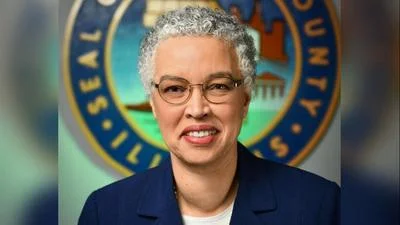Oak Park hasn't opted out of a countywide ordinance to raise the minimum wage that takes effect on July 1, leaving many local businesses wondering whether they have a future in the Chicago suburb.
In fact, having to pay higher labor costs has some business owners questioning whether they will be able to hire and retain high school and college students seeking summer jobs.
“The costs to small and mid-sized business owners will grow far more than just the wage increase -- notably from state, federal, and county payroll taxes, workmans' compensation and insurance,” Peter Morava, the owner of Oak Park's CarefulPeach Boutique, told the West Cook News. “It should be noted that certain jobs are to be entry level, meaning that the value in the job is more than payment. It is a life learning lesson developing skills like an internship. Basically, your first real job other than babysitting, etc. It's to teach you to show up when scheduled, dress appropriately for your work, interacting with others, and receiving instructions and accomplishing tasks.”
Morava argued that the increased taxes and burdens on business isn’t a partisan issue but an economic one that should be determined by the proprietor of the business.
“Let me be clear: Every one of my employees is paid more than minimum wage, and I am a Democrat,” Morava said. “But to have my village, my county and my state dictating compensation levels for my business when they haven't paid their bills -- already paid for by our tax money -- owed to our neighbors for over two years is ludicrous. It is so easy to spend other people’s money.”
Cindy Summers, the owner of Sugar Fixe, a downtown Oak Park pastry shop, said that the potential impacts of policies like this are very worrisome.
“The proposed minimum wage will make it much harder for me to consider teenagers and low-skilled candidates for open positions,” Summers told the West Cook News. "The higher minimum wage will command experienced candidates. The only way I could continue to hire people entering the workforce for the first time is to raise prices.”
Summers is particularly worried about paid sick leave, as well as the minimum wage hike.
“I anticipate paid sick leave will cost my business over $10,000 in the first year,” she said. “That amount cannot be covered by price increases alone. I am really concerned about the impacts these two ordinances will have on small businesses, and by small businesses I mean the business owners and all the employees that work for them. Not only are businesses being required to provide paid sick leave, it will be at a higher minimum wage. The financial impact of these combined ordinances could be the tipping point for a struggling business, or it could mean the elimination of jobs to cut expenses and stay afloat.”
According to the Chicago Sun-Times, more than a third of the cities and municipalities under Cook County’s authority opted out of either the new minimum wage, paid sick leave, or both.
Several Oak Park Board members have voiced their concerns about not opting out, taking to social media to inform constituents that the board's meeting on June 19 will be used to discuss whether to do so.
"I've already been getting calls from companies that install ordering kiosks that allow customers to place their own orders," trustee Deno Andrews wrote in a Facebook post. "These already exist in Europe, where the labor costs are traditionally high. So the question is which is better, a higher minimum with fewer people working or a lower market-based wage that puts more people to work? I don't think we can have it both ways."
Cook County commissioners installed the new ordinances as ways to pay low-income workers living wages. An official document from the Cook County Commission on Human Rights – the county-level agency administering the minimum wage increase – explains that pay for non-tipped hourly employees will increase to $10 from $8.25 on July 1, with annual $1 increases until 2020, when it hits $13. Thereafter, the commission will determine the next increase for the years following.
Hourly rates for tipped employees will also be subject to determination by the same commission.
The panel also has the responsibility of administering the new paid sick leave ordinance, which requires employers to cover paid sick leave for employees who have worked a certain number of hours.
The ordinances carry violation penalties that include the imposition of fines, mandated restitution paid out to an employee and injunctive relief.
Tim Worstall, a senior fellow at the London, U.K.-based Adam Smith Institute, argued that the pay hikes will be intrinsically tied to higher taxes.
“For it's easy enough to think that sure, those people over there should get more money,” Worstall wrote for Forbes. “And it's especially easy if we all think that it's them, they, the capitalists, the rich people, who will have less money after those higher wages are paid. It might well be rather different as people realize that it will be their own pockets that get picked to pay these higher incomes.”






 Alerts Sign-up
Alerts Sign-up